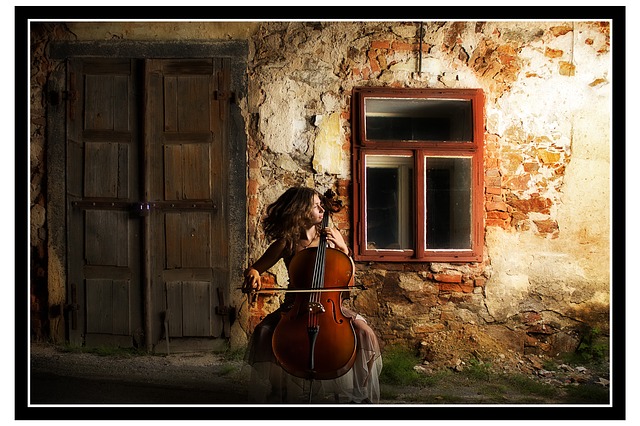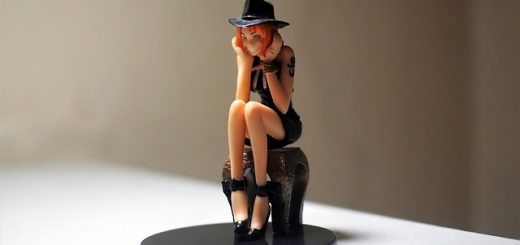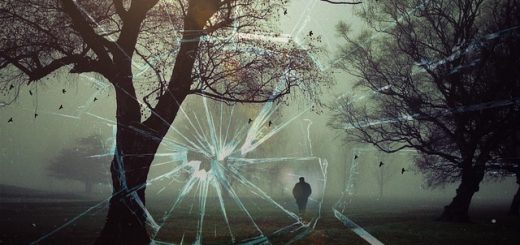The Future of Sound by Michael Bryan

The Future of Sound by Michael Bryan
The crowd shifted uneasily in their seats. The dimly lit stage sat empty. The people murmured quietly amongst themselves, the anticipation hanging thick inside the small theater.
“I hope she shows tonight…” Uttered one of the audience members quietly as he disappeared into the smoky room.
Everyone was there for a different reason. Each with their own motives for being present tonight. Hoping to bear witness. Yearning to see. She knew the greed that hid behind their eyes, and she knew the power she held over them.
Eva lit the old candle and placed it by the cracked window. The shadows danced across the logs of the cabin walls, jumping ghostlike from one to the next. She squinted through the glass, watching the bright red and orange leaves drift across the dying grass out front.
It was getting late. She knew that word had gotten out since she first pulled into town. Initially, her crowd was one or two people just looking for a break from the biting, cold winds of late autumn. Looking for someplace warm, and curious about the title on the placard of the old theater, “The Future of Sound.” Intriguing. Inviting. They wandered in out of necessity, and they left awestruck.
Their preoccupation with the cold quickly dulled when she began playing. The frigid temperature outside faded into a distant memory, easily replaced by the manic heat of a brain on overdrive. The audience quickly became believers, and tonight, she expected to play to a sold out crowd of her entranced disciples. Word had gotten out. Their morbid curiosity drove them into their seats tonight.
She needed to leave. She tried in vain to dress in layers, but the chilled November air was too unforgiving, too stubborn, and was as intrusive as the nosy locals. Maybe mom was right. Maybe I don’t have a soul, she thought. She knew that was too simple an explanation. She knew her “gift” was so much more.
Gift…curse…affliction. They had struggled with what to call it since it was first discovered. What started as talent, quickly mutated into a plague. She had been a prodigy. Playing the cello was as natural as breathing, and, once she started playing, she couldn’t stop. Day in, day out, she played.
Her fingers could intuitively play any song she heard. Her mother told her it was a gift, a blessing. It’s ironic that some blessings, however, seem to come with a need for absolution.
When she was about 11 or 12, the images began. Her gift manifested itself in dark shadows at first, barely perceptible. The images materialized above her head in smoky clouds as she played her music. They were dimly lit scenes at first of couples holding hands at the park, beautiful sunsets, and happy families, all swaying in wraithlike motion to every note she performed. Soon, the images became dark, horrific scenes pulled forth in high definition with each pull of her bow across the strings.
One day, her mother came in while she was playing. Usually her mother watched the images in awe and wonderment; although, lately, they were cause for concern. Today, her mother’s gaze was vacant, shocked, her face porcelain pale.
The image had been of her father…a car crash…a twisted body…so much blood. It filled the small space of her bedroom and painted it red. Eva dropped the bow, the last note drawing out as her father gasped his last breath. Then it was gone.
The frantic call came about an hour later. He was dead. Her father was gone and her mother just watched her daughter play out his requiem. Her mother never looked at her the same after that. The unconditional love was gone, now exiled by fear.
Then came the agency. The tests. More music, more images, more death. A plane crash in Nevada. A suicide jumper in San Francisco. It always came an hour later, sometimes earlier. Confirmation. Validation. She was different, special, a weapon.
She was taken to a private facility and tested. Her life was music, but it had been tainted now. It made her sick to play. She would refuse and they would drug her, force her to play and the images kept coming. They were in her dreams. The screams of the victims, the crunch of metal, the din of an explosion, all these things selfishly robbed her of her sleep.
It drove her mad, until, one day, she just cracked. The doctors said her brain couldn’t handle the trauma and it just shut down. She forgot how to play, the images stopped coming, her fingers, once her most trusted ally, were now submerged in her guilt and fear. Simply put, she couldn’t play a not for the next year. After a while of trying in vain to get the images back, they realized she wasn’t useful anymore, and they cut her loose.
Eventually, her talent began to creep back into her consciousness. Her desire to play started to return and the bow once again felt comfortable in her fingertips. As her talent returned, so did the images. She began to panic. What if they came back for her? What if they forced her to play again? What if? What if…
That was all years ago. Nowadays, she kept herself moving. Small towns where nobody actually exists anyway, forgotten by the pulse of time. These places don’t move on, they are stuck in some memory of a town that once was. These were her people, her audience, her devotees. They didn’t love her, instead they feared her, and many hoped to figure out the secret to her magic.
She pushed open the door to the theater, the faded wallpaper and all too familiar threadbare carpeting making her feel at home. The audience turned and stared at her as she waded through their anticipation, judgement, and skepticism to the stage.
She unpacked her cello, the once bright colors of the spruce body now faded to a dull brown, and placed the endpin on the floor between her legs. She carefully slid out the bow and began to play.
She didn’t utter a word to the crowd. She always felt like they were expecting some sort of explanation, an introduction, something that made them feel safe. The people that came to watch her weren’t her fans, they were life’s rubberneckers, driving slowly by the scene of an accident, hoping to get a look.
The notes flowed from her fingers and the images began. She closed her eyes and manipulated the fingerboard. The haunting sounds of the cello took hold of the audience, they were spellbound, captivated. Then, the images began. At first small wisps of smoky air. Then the wisps mutated into pictures. The pictures began to move and a story took shape.
A woman was sitting in her car at the edge of a lake, the moon reflecting off the glassy liquid below. Her children were in the back, screaming in terror, while she sobbed hysterically, her knuckles white from her grip on the wheel. She kept looking at her children in the mirror, then ahead at something the audience members couldn’t see. The woman’s eyes sank, defeated and she slowly put the car in gear. The audience could make out “god forgive me” from the woman’s lips as she slammed the car into gear and drove into the murky, cold lake. Water quickly filled the car, the hands of the frightened children leaving streaky imprints on the windows. Then it disappeared beneath the surface, as the water from the lake once again settled into an undisturbed stillness. The audience gasped at the scene playing out above Eva’s head. A man stumbled from his chair in a panic. “Those…those are my babies” he stammered and sprinted for the exit, his boots echoing his terror off the wooden floor, accented by the screams of the crowd. As her last note reverberated, the audience descended into chaos.
THE END
Copyright Michael Bryan 2019























